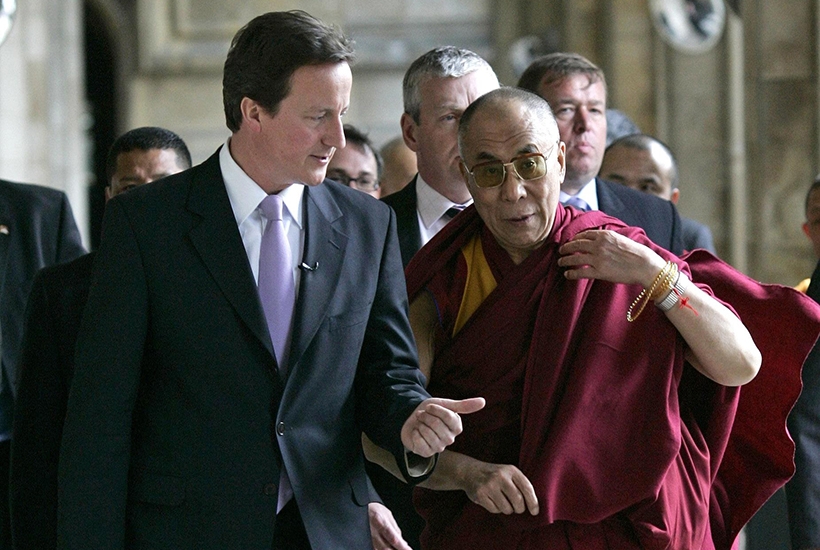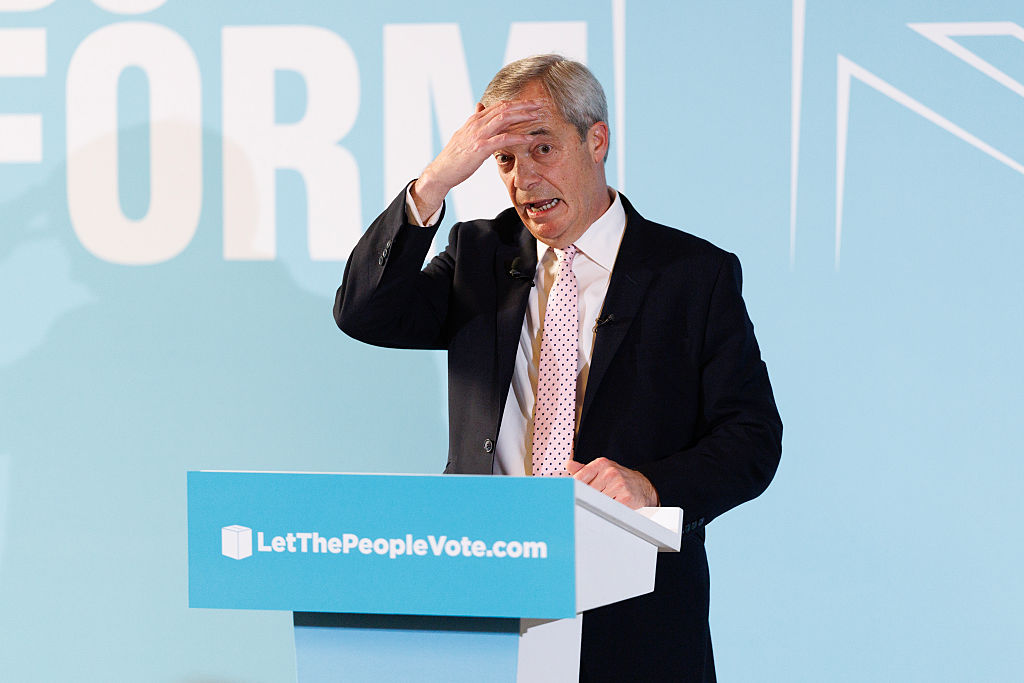Like nearly everything named a ‘scandal’, ‘affair’ or given the post-fix ‘gate’, almost nobody now remembers the Dalai Lama affair. But back in 2012, flush with recently acquired power and optimism, David Cameron and a man called Nick Clegg went to see the Dalai Lama while he was on a trip to London.
Whether Cameron and Clegg knew what they were getting into wasn’t clear. The pair had a short meeting with the Lama at St Paul’s Cathedral — or at least in one of those bland conference ante-rooms English cathedrals constructed in the last century to atone for the splendors next door. Looking like a couple of traveling salesmen trying to flog the Dalai Lama a timeshare, Cameron and Clegg had the meeting and moved on.
Not so Beijing. The British ambassador was immediately called in and given the traditional post-Lama telling off. In the wake of the meeting the Chinese Communist party announced relations with Britain had been damaged. Sure enough, Chinese investment into the UK went on hold. A trip to the UK by Chairman Wu Bangguo was called off. And the CCP talked about how ‘hurt’ the Chinese people had been by the meeting.
You can do that sort of thing if you are a dictatorship: pretend to act as the mouthpiece of more than a billion people, not one of whom can hold you to account. But Cameron got understandably spooked and — proving himself years ahead of the game — announced plans to socially distance himself from the Dalai Lama. Indeed soon he was declaring that he saw no need ever to meet him again. The British government issued an apology to the Chinese authorities for all the offense caused and normal trade relations were eventually restored.
It was the account of the first meeting between British and Chinese officials after this affair that was so memorable. I was told that before the meeting could get under way, the CCP officials attended to a bit of old business. A copy of the British apology was pushed across the table towards the British officials, who were then asked to stand up and read it out loud, which they duly did. Sitting down afterwards, the lead Chinese official apparently smiled and said: ‘We just wanted to know you meant it.’
I doubt there is a British subject whose skin doesn’t crawl at the thought of someone being so abject on our behalf. But there it is. A nadir of the conundrum that Britain — and the wider world — has long known ourselves to be in.
We always realized that there were price tags attached when dealing with the CCP. And as our politicians have repeatedly learned, the line between receiving the largesse of China and receiving orders from it is a fine one.
Other countries have been aware of this for years. On a trip to Australia in 2018 I was struck by how much further along the road the public’s understanding of the China conundrum was there compared with in Britain. They had long since passed through their politicians praising the benefits, watched them join the boards of Chinese companies, and then slowly but surely observed the political class back away as they saw what that cooperation entailed.
Today the Australians have an advantage over us. While we have a vast trade deficit with China (around £20 billion), Australia has a vast trade surplus with the country (around £30 billion). Even so, they remain vulnerable to the CCP’s normal diplomatic routine of extortion and threats.
Towards the end of last month the Australian government started calling for an international, independent inquiry into the origins of Covid-19. This followed intelligence leaks suggesting that the virus may have originated in a laboratory in Wuhan rather than one of the city’s famously delicious wet markets. The Chinese response was textbook. The country’s ambassador to Australia warned the Australian Financial Review that the Chinese public (there they go again) were ‘frustrated, dismayed and disappointed with what you are doing now. If the mood is going from bad to worse, people would think why we should go to such a country while it’s not so friendly to China. The tourists may have second thoughts.’ Students, parents and consumers were also said to be on the verge of once again choosing bat soup over Aussie beef and Shiraz.
In other words, the CCP’s response to Australia was the usual mob trick: nice continent you’ve got there. Shame if anything happened to it.
The editor of the state-run Global Times, Hu Xijin, was less diplomatic. Hu took to Weibo (China’s answer to Twitter) to describe Australia as a piece of ‘chewing gum stuck on the sole of China’s shoes’. He went on: ‘Sometimes you have to find a stone to rub it off.’ As Britain learned in 2012, the stone that China uses to get rid of us pieces of chewing gum is a familiar one. It involves the full litany of investment threats. And it includes claims — issued from its embassies worldwide — that all criticism of the CCP is motivated by ‘racism’.
Of course the CCP has no interest in bigotry. A survey of what it has been willing to do to the Uighur people over recent years might go some way to countering that claim. But it knows the West is cowed by such distractions. After all it isn’t very many weeks since Nancy Pelosi was telling Americans to visit their local Chinatown and the mayor of Florence was urging residents of his city to hug a Chinese person to fight racism and coronavirus.
Yet just as surely as Cameron was ahead of his time, so the Florentine mayor turned out to be behind his. We have been hugging China for years now, and it didn’t make us better. It made us sicker. And not just virally, but psychologically too.
It isn’t healthy to have your officials lick another country’s shoes. Or be told that you’re chewing gum on the bottom of them. We need to find a way out of this relationship — one that we all know turned abusive years ago.
This article was originally published in
The Spectator’s UK magazine. Subscribe to the US edition here.

























